Dental Implants – Edison, NJ
The Pinnacle of Tooth Replacement
Are you tired of dealing with the gaps in your smile? Are you annoyed by an unreliable denture or dental bridge? If so, you’ll love dental implants. By far the most lifelike and comprehensive way to replace missing teeth, dental implants are the next best thing to having your home-grown pearly whites back. Whether you need to replace a single lost tooth or all of the teeth in your smile, Dr. Hiren Shah can perform every step of the treatment process right here in our familiar dental office! To schedule an appointment and find out if dental implants in Edison, NJ are right for you, call Signature Smiles today!
Why Choose Signature Smiles at Edison for Dental Implants?
- All Steps of Dental Implant Treatment Performed Under One Roof
- 3D Cone Beam Imaging for Precise, Predictable Treatment Planning
- In-House Dental Plan Makes Care Affordable
What Are Dental Implants?

Dental implants are the only tooth replacement option designed to recreate both the root of your tooth (the part hidden beneath the gum tissue) as well as the crown (the part that is visible when you smile). The dental implant itself is a titanium post that integrates with your bone and soft tissue. The implant is placed directly into the jaw during oral surgery. Then, it is given time to heal before a permanent dental crown, bridge, or denture (depending on the number of teeth you’re replacing) is secured on top. In the end, you have a complete smile that looks, feels, and functions like you’d never experienced tooth loss in the first place!
The Dental Implant Process
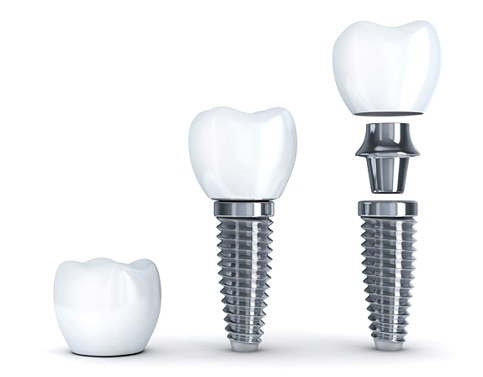
Dental implants offer many benefits you won’t find elsewhere, but receiving them takes time and multiple phases of care. As you become more familiar with them, you’ll find that the process of dental implant placement involves four main steps. This includes the consultation, surgery, healing period, and placement of the final restoration. Each step is crucial to rebuilding your smile and ensuring your replacement lasts for many years to come. To learn more, keep reading or give our office a call to schedule a consultation.
Initial Dental Implant Consultation

At your first visit, Dr. Shah will perform a detailed exam in order to determine if dental implants are right for you. Along with confirming which teeth are missing and how many, he’ll evaluate your current oral health and make sure there is no existing dental disease. If you have tooth decay or gum disease, these problems will need to be handled first. Additionally, you may have diminished bone tissue as a result of your tooth loss, meaning a bone graft could be necessary before you can receive dental implants.
Dental Implant Surgery
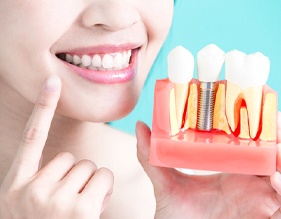
Because of our in-house expertise from Dr. Shah, he’s able to perform the entire dental implant process in one location. There’s no need to visit multiple dental offices in the area or be forced to work with dentists you might not already be familiar with. Keep in mind that the length of your treatment will vary depending on the number of teeth you need to replace.
To place the implant, a small incision is made in the gum tissue, then a tiny hole inside the open socket where your natural tooth was previously. From there, the titanium implant is placed and the gums are stitched closed.
Dental Implant Osseointegration & Abutment
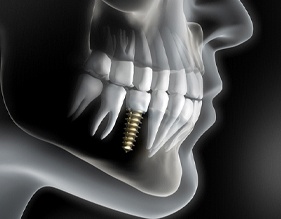
After your surgery, the implant will begin to fuse with the jawbone. This process is called osseointegration and it’s able to occur because of titanium’s natural ability to merge with organic bone tissue. Over the next four to six months, the bone and soft tissue will heal around the implant, creating a stable foundation for your permanent restoration. Eventually, you’ll come back to our office to have the abutment attached, which is a metal connector that acts as an attachment for your crown, bridge, or denture. Following placement of the abutment, a couple more weeks of healing are needed before you come back for your restoration.
Delivery of Dental Implant Restoration(s)

At your final appointment for dental implant placement, you’ll visit Dr. Shah to receive your custom-made restoration. Whether you’re receiving a crown, bridge, or denture, you can expect it to look and feel incredibly natural once it has been attached to your implant post. Before you leave, we’ll make sure that your bite is even and any concerns you have are addressed. We’re confident you’ll love your new smile after your permanent restoration is attached!
Benefits of Dental Implants

There are many tooth replacement options out there, but none quite stack up to dental implants for a number of reasons. While dental bridges and dentures give you back your smile and prevent neighboring teeth from moving out of place, they don’t address many of the underlying issues that come with tooth loss. Below, you can read about just a handful of the most notable benefits you can expect following the final phases of your dental implant treatment.
Day-to-Day Benefits

- Stronger Biting Force - Since dental implants replace the root, the titanium post continually stimulates bone tissue and keeps it preserved. This helps the biting force of the jaw stay strong, making it easy to chew and enjoy the foods you love.
- Natural-Looking Appearance – Dental implants are known for promoting blood flow to the face and keeping skin elastic and taught. This is in stark contrast to the skin sagging and the cheeks hollowing out, a common side effect of tooth loss.
- Easy Brushing and Flossing – No longer do you need to worry about removing a denture just to keep it (and your mouth) clean. Simply brush and floss as normal to prevent plaque buildup. As a bonus, the restoration attached to your implants cannot develop decay!
Health Benefits

- Maintain Original Tooth Structure - With the titanium post acting as the main anchor for your replacement tooth, you don’t need to modify existing teeth just to have dental implants placed! This is the case whether you intend to have single or multiple teeth replaced with dental implants.
- Reduce Risk of Future Tooth Loss – As implants consistently stimulate the jawbone, they keep it from breaking down in the long-term. This means the jawbone remains strong enough to reduce the risk of future tooth loss, a common side effect that can develop following tooth extraction.
- Expand Your Diet – Getting a healthy balance of fruits and vegetables is much easier when you aren’t limited by the foods you’re able to consume.
Long-Term Benefits

- A Truly Long-Lasting Solution - Along with the restorative benefits of dental implants comes the longevity. When practicing at-home oral care and maintaining dental visits, you can expect your dental implants to last 30 years or longer! This benefit combined with their enhanced esthetics makes them a winner for long-term use and appearances.
- Reliable – The success rate for dental implants hovers between 95 and 98%, making it an excellent choice for those looking for peace of mind for their tooth replacement. This is the case even after 10 years of use, a timeframe where both dentures and bridges typically require replacement.
- Cost-Effective – While dental implant treatment may not be as affordable as other options, the longevity they provide ensures you won’t have to spend as much money to cover additional replacement once they become worn down. That’s why it’s worth thinking of dental implants as a long-term investment.
Who Dental Implants Can Help

At Signature Smiles at Edison, we are pleased to provide dental implants as a viable solution for patients suffering from tooth loss. Because most adults will qualify for this type of procedure, it is a great opportunity to embrace a better quality of life. However, there are instances in which an individual will need preliminary treatment before undergoing dental implant surgery. While this isn’t always the case, these additional services can help to strengthen and ensure the success of the dental implants once they’re put into place. Our dental implant dentist in Edison, Dr. Shah, will make sure that no matter the outcome of your initial consultation, you will walk away with a healthy, beautiful smile in the end. Contact us today to schedule an appointment to find out if you are eligible for dental implants.
Who Is a Good Candidate for Dental Implants?

As we mentioned before, most adults with tooth loss are eligible for dental implants; however, it is necessary to undergo an initial consultation with Dr. Shah. During this appointment, you can expect a full examination of your oral cavity and facial structure to determine:
- The status of your oral health and if you have gum disease or severe decay that would result in periodontal therapy or tooth extraction.
- The status of your overall health, as you will need to be cleared to undergo minor oral surgery and possess no medical conditions that might lead to dental implant failure (i.e., diabetes, autoimmune disorders).
- The density of your jawbone, as there must be enough to support your implants and restoration. Otherwise, you will need bone grafting before receiving dental implants.
Do not be dismayed by the idea that your smile or health may not be “good enough” for dental implants. Only Dr. Shah can determine your eligibility and will go above and beyond to provide additional treatments to get your oral cavity ready for permanent prosthetics.
Dental implants in Edison are perfect for any number of cases. Whether you need to replace a single tooth or all the teeth in your arch, we can customize your treatment to address your exact concerns.
Missing One Tooth

If you want to avoid being one of the 120 million Americans living with a single missing tooth, it’s best to opt for dental implants. While it may not seem like a big deal, a single missing tooth can lead to more impactful bone and tooth loss as well as difficulty eating and speaking. To replace a single tooth, a titanium post is placed into the jaw and given several months to heal and integrate. After this process is complete, a metal abutment is placed onto the implant, so the permanent ceramic crown has a reliable foundation. We utilize tooth-colored materials to ensure the best-looking tooth replacement possible.
Missing Multiple Teeth

When multiple consecutive teeth are missing, two implants are used to support a custom dental bridge. Since the implants do all of the heavy lifting, they can hold your restoration entirely. This means no existing enamel has to be removed so they can act as anchors for your restoration. Another beneficial aspect of choosing dental implants for multiple missing teeth is that we can create an implant-supported partial denture if you have several gaps along your arch.
Missing All Teeth

When replacing an entire arch of teeth at a time, a series of implants are placed throughout the jaw and given time to heal. Typically, we will use anywhere from four to eight dental implants and secure them to your jawbone before adding the metal abutments and customized implant denture. Whether you choose a fixed or removable prosthetic is up to you, but you can trust that Dr. Shah will provide a beautiful restoration that offers greater functionality and longevity. Not to mention, your bone will continue to be stimulated because of your implants and their ability to mimic the natural tooth root.
Learn More About Implant Dentures
All-on-4 Dental Implants

With All-on-4 dental implants, we can perform the surgical portion of your treatment the same day that your restorations are placed, meaning you can walk out with a new smile even sooner! Using only four strategically placed dental implants, this is most commonly recommended for individuals with less jawbone density and who have been missing teeth for quite some time.
Understanding the Cost of Dental Implants

It is true that dental implants tend to cost more than more traditional tooth replacement options, but your treatment is likely to vary in cost depending on how complex your needs might be. The number of teeth you replace, the specific teeth you need to replace, and the need for potential restorative treatments (i.e., bone grafts) can all influence your total cost. With that said, dental implants are proven to last for decades when placed by a professional, meaning you can expect to pay less in the long-term compared to more short-term solutions like bridges and dentures.
Types of Dental Implants

The simple fact is that there isn’t really a set-in-stone price for dental implants that can be used for each case. This is largely because the cost of the procedure largely depends on the number of teeth that need to be replaced. Have you only lost a single tooth? Then you can get a single implant along with a crown. Are you missing several teeth in a row? You’ll likely need a dental bridge supported by a pair of implants. Is an entire arch of teeth gone? It will take around four to eight implant posts to anchor full dentures in place. Once we know the extent of your tooth loss, we can give you a good idea of what the final price will be.
What Are the Stages of Dental Implant Treatment?

When planning your budget to pay for dental implants, you need to remember that each stage of the process carries a separate cost. This means you don’t need to pay the entire amount up front. The different phases of the treatment typically include:
- An initial consultation (which likely includes digital X-rays and a CT scan) to confirm that dental implants are viable.
- Additional treatments like bone grafting or tooth extractions to prepare for implant placement.
- Placement surgery, during which your mouth will be numbed to prevent discomfort.
- Attachment of a special fixture called an abutment.
- The design and placement of a crown.
Are Dental Implants Worth the Investment?

Dental implants may seem like a more expensive form of tooth replacement at first, but the trade-off is that they have an extremely high success rate and can last for several decades. That means you will very rarely – or, ideally, never – need to have your dental implants replaced. This can end up saving a lot of money over the years when you consider how often you’d need to pay to have traditional dentures replaced or adjusted. There are also numerous benefits that you’ll only be able to enjoy with dental implants; for example, they stimulate the jawbone to help it preserve its density, thus preventing long-term oral health issues like dental drift.
Does Dental Insurance Cover Dental Implants?

Dental implants are considered by many insurance companies to be a cosmetic treatment and thus often aren’t covered. That said, your policy might help pay for certain aspects, such as gum disease treatment or the placement of a restoration. Our team will work on your behalf with your insurance company to make sure you get the benefits you’re entitled to. We can also point you towards other payment options, such as CareCredit.
Dental Implant Failure & Salvage

Dental implants have an incredible success rate, but dental implant failure is still possible. If your newly rebuilt smile is beginning to feel uncomfortable or you have any arising concerns, don’t hesitate to give us a call as soon as possible. By acting quickly, we may be able to restore your smile with dental implant salvage treatment.
Learn More About Dental Implant Failure & Salvage
Dental Implants Post-Op Instructions

When it comes to oral surgery, the recovery period is absolutely crucial—if things don’t heal up properly, you might end up with more problems than when you started! Here at Signature Smiles at Edison, we’re happy to assist you with every single step of the recovery process and ensure that your post-op instructions make sense and are easy to comply with. Below we’ve provided some general guidelines that you might find useful as you recuperate; of course, feel free to contact us with any concerns you have or as soon as you experience a complication.
What To Do Directly After Dental Implant Surgery

Perhaps the most important priority to keep in mind while recovering from dental implant surgery is protecting the blood clots that form over the surgical sites. These blood clots are instrumental in the healing process, so safeguarding them will ensure that your gums can recover properly around your new implants. Here are some tips to assist you with this:
- Avoid spitting; use tissues instead or swallow your saliva.
- Do not use a drinking straw, as the suction can dislodge the blood clots.
- Do not smoke or use tobacco products—they’re notorious for causing a slew of oral health issues and will impede your body’s healing capabilities!
- Refrain from touching the surgical sites with your tongue or fingers.
Common Side Effects When Recovering from Dental Implant Placement

It can be difficult to determine which symptoms are normal and which ones aren’t following dental implant placement, especially if you’ve never undergone oral surgery. It’s normal for patients to experience mild soreness; however, these symptoms normally resolve after a few days. If you’re experiencing symptoms that seem to worsen over time, don’t hesitate to contact us for help! A few common side effects you can expect after your procedure include:
- Minor discomfort, which can often be relieved with over-the-counter pain relievers.
- Swelling in the gums; however, this can usually be alleviated with cold compresses.
- Intermittent bleeding, which can be managed by applying gentle pressure with clean gauze over the surgical site.
Your Diet After Dental Implant Surgery

Following your procedure, you’ll need to stick to softer foods for a few days to avoid disrupting the blood clots that form over your surgical sites. Your meals should include things like:
- Lukewarm soups and broths
- Mashed potatoes
- Scrambled eggs
- Pasta
- Pudding
- Yogurt
- Smoothies and protein shakes
Post-Op Health & Oral Hygiene

Maintaining proper oral hygiene following dental implant placement will give your new smile the best chance of lasting success; if osseointegration isn’t able to occur due to unfavorable circumstances, your implants might fail! Here are some hygiene tips to follow moving forward:
- Brush your teeth like normal following your surgery, but be careful when brushing near the surgical sites.
- Rinse your mouth with salt water 2 – 3 times a day, especially after eating—however, instead of spitting out the water, let it pour from your mouth into the sink.
- Avoid mouthwashes that contain alcohol; they can cause some serious discomfort!
What to Do After Your New Teeth Are Attached

Once you’ve made a full recovery and your implants have successfully fused with your jawbone, you can finally receive your new replacement teeth. It’s possible you may experience sensitivity in your gums following this, but you should be able to manage it using over-the-counter pain medication. If you do notice any bleeding or swelling following this step, don’t hesitate to let us know!
Maintaining & Caring for Your Dental Implants

Have you made the choice to replace your missing teeth with dental implants in Edison? You’re making a wise decision for your oral health and your quality of life. Dental implants are the most reliable solution to treat tooth loss. In fact, they have over a 95% success rate. They are proven to last for decades with the right aftercare, so you should never need to worry about paying to have them replaced. Here are a few easy ways to protect your investment to ensure they last for a lifetime.
Make Oral Hygiene a Priority

The risk of dental implant failure is less than 5 percent. It’s most often caused by a preventable infection called peri-implantitis. This is an infection similar to gum disease that’s caused by bacteria in plaque and tartar buildup. Although failure is rare, it’s best to be proactive about your oral hygiene habits to keep the infection at bay.
Your dental implants aren’t subject to tooth decay, but you’ll still need to brush at least twice a day. It’s best to use a soft-bristled toothbrush and nonabrasive toothpaste to clean all surfaces of your dental implants and any natural teeth for at least two minutes each session.
Besides brushing, you’ll need to use a high-quality dental floss to clean around the abutments and in between natural teeth daily to remove any buildup missed by your toothbrush. Some people find a water flosser to be easier to use than standard floss.
Protect Your Dental Implants
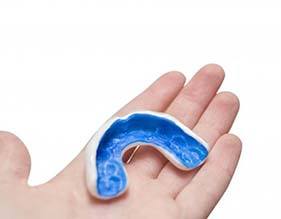
Dental implants are made of durable material to withstand the pressure of daily use to enjoy your favorite foods, but they aren’t indestructible. It’s best to protect them from any unnecessary damage. If you play sports, be sure to wear an athletic mouthguard. This provides a protective barrier in case there’s trauma or injury to the mouth or face.
If you suffer from bruxism, the force of grinding and clenching can cause your dental implants to fail. It’s best to ask your dentist in Edison about a nightguard. This creates a barrier between your upper and lower teeth to reduce the friction that can lead to failure of your new smile.
Schedule Regular Dental Checkups

The American Dental Association recommends everyone sees their dentist at least twice a year, even those who have dental implants. Regular recall appointments are more important than ever to ensure your new smile lasts.
You’ll need a thorough cleaning to remove any plaque or tartar accumulations around the abutments and posts. This reduces harmful bacteria in your mouth that can irritate and infect in the gingival tissue. Besides a good cleaning, we’ll also monitor your oral health and your dental implants. This allows us to detect any concerning areas sooner to provide quick intervention. Prompt treatment is crucial for preventing complete dental implant failure.
Dental Implant FAQs
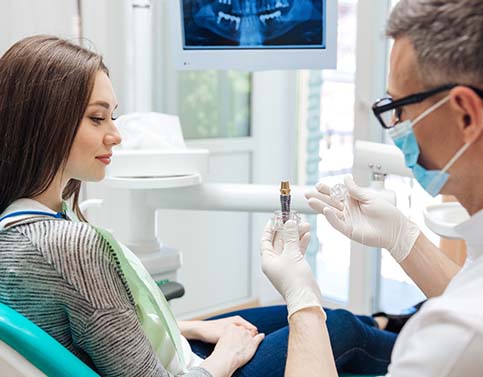
When it comes to replacing missing teeth, dental implants are often considered the gold standard due to their longevity, durability, and ability to replicate the entire structure of the missing tooth, not just the crown. Before going through with the treatment, however, it is likely that you have a few questions. Don’t worry, we’ve taken the liberty of answering some of the frequently asked questions that we get about dental implants in Edison.
How Long Do Dental Implants Last?
Dental implants are designed to last upwards of thirty years. The good news is that you can prolong that lifespan even further by taking proper care of your implants. This includes brushing and flossing around your implant restoration every day as well as seeing Dr. Shah for a checkup and cleaning at least twice a year, or every six months.
Will I Have to See an Outside Specialist to Receive Dental Implants?
Not at all! Many general dentists lack the specialized knowledge and skills required to place dental implants, so they have to refer their patients to a periodontist or oral surgeon. However, Dr. Shah has completed enough advanced training throughout his career to be able to place and restore any number of dental implants in-house. You can rest easy knowing that the dentist you trust can give you your new teeth without having to refer you to a stranger.
Does It Hurt to Get Dental Implants?
While it might sound painful to have a titanium post placed directly into your jawbone, the truth is that you should only experience minimal discomfort during your procedure. This is because we use plenty of local anesthetic, and sedation if need be, to numb you up and soothe your worries before placing implants.
Because getting implants involves minor oral surgery, you can expect to deal with some degree of soreness and swelling for a few days after your procedure. However, this is nothing that can’t be managed by taking your prescribed or OTC pain medication and/or applying a cold compress to your face in ten-minute intervals.
Am I Too Old for Dental Implants?
Not at all! In fact, we have had patients as old as their nineties come in to get implants because they are unsatisfied with their ill-fitting dentures. As long as you are in good general health and are willing to undergo a bone graft if necessary to strengthen your jawbone, there is no upper age limit on dental implants. However, we do not place implants on patients ages eighteen and younger, as their jawbones are still developing.
